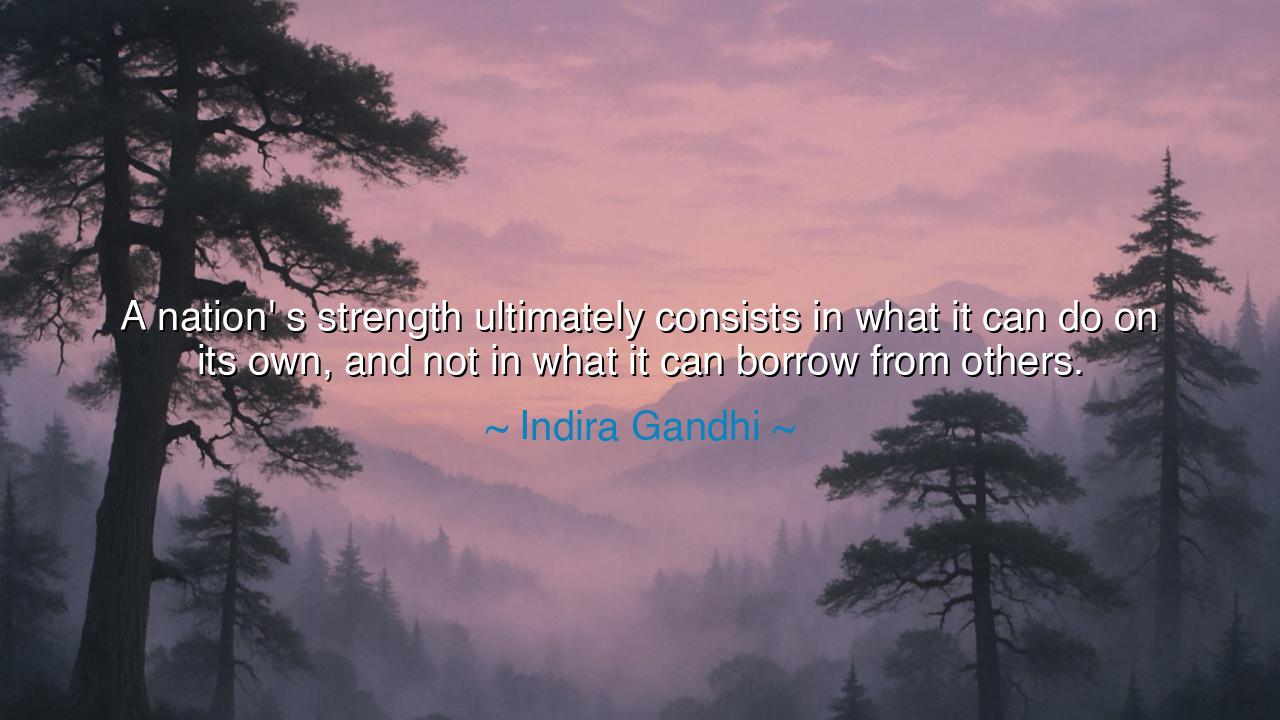
A nation' s strength ultimately consists in what it can do on
A nation' s strength ultimately consists in what it can do on its own, and not in what it can borrow from others.






The words of Indira Gandhi resound like a call to sovereignty: “A nation’s strength ultimately consists in what it can do on its own, and not in what it can borrow from others.” These words are not merely political counsel, but a truth carved from the heart of history itself. For nations, like men, may lean upon others for a time, but lasting greatness can never be sustained by borrowed crutches. True power is forged in self-reliance, in the ability to create, endure, and rise without depending on the hand of another.
To speak of strength in this sense is to speak of more than armies and wealth. It is the strength of will, of spirit, of culture, of the ability to endure hardship without begging for rescue. Borrowed riches fade; borrowed weapons break; borrowed wisdom weakens with time. But the strength a people carve with their own hands, the institutions they build, the skills they teach, the soil they till—this becomes the bedrock upon which nations endure for centuries.
The origin of this truth in Indira Gandhi’s life lay in her own nation’s struggle. India had been bound for centuries under colonial rule, its wealth siphoned, its will subdued. Yet after independence, the call was clear: India must not simply trade one form of dependence for another. Gandhi, standing as leader, urged her people to cultivate food through the Green Revolution, to produce their own grain, to secure their own survival. For she knew that a hungry nation that relies on foreign bread is never truly free. In urging self-sufficiency, she reminded her people that dignity is born not in what is borrowed, but in what is built.
History gives us countless mirrors of this wisdom. Consider Japan after the Second World War. Broken, scarred, and humbled, it could have relied endlessly on aid and pity. Instead, it turned inward, harnessing the ingenuity of its people, mastering industry, technology, and innovation until it rose again as one of the strongest economies of the modern age. Its strength did not lie in the alms of others, but in the sweat of its own people.
So too, we see the opposite truth. Nations that rely too heavily on others for their armies, their food, their energy, their wisdom, become like trees with shallow roots. When the storms come, they are torn from the soil. The empire of Rome itself fell in part because it leaned upon mercenaries, foreign soldiers with no loyalty to the heart of Rome. Borrowed strength has no permanence, for it does not bind itself to the soul of the people.
This lesson reaches beyond nations and into the hearts of individuals. For just as a nation must stand upon its own labor, so too must a man or woman. To live always on borrowed courage, borrowed ideas, borrowed dreams is to remain weak. But when you labor for your own bread, when you train your own mind, when you stand upon your own convictions, you carry within you a strength that no one can take away.
Practical action lies in this: build. Whether as a nation or as an individual, cultivate what is yours. Learn skills, foster resilience, create resources. Seek knowledge and industry within your own community before asking the world to provide. And when help does come, let it be not your lifeline, but your supplement. Dependence breeds fragility; self-reliance breeds power.
So let Indira Gandhi’s words be remembered as law: a nation’s strength is not in what is borrowed but in what is born of its own hands. And so it is with all of us. Stand upon your own labor, rise upon your own resolve, and know that the truest freedom, whether of a people or a person, is found not in leaning, but in walking steadfast on your own two feet.






AAdministratorAdministrator
Welcome, honored guests. Please leave a comment, we will respond soon